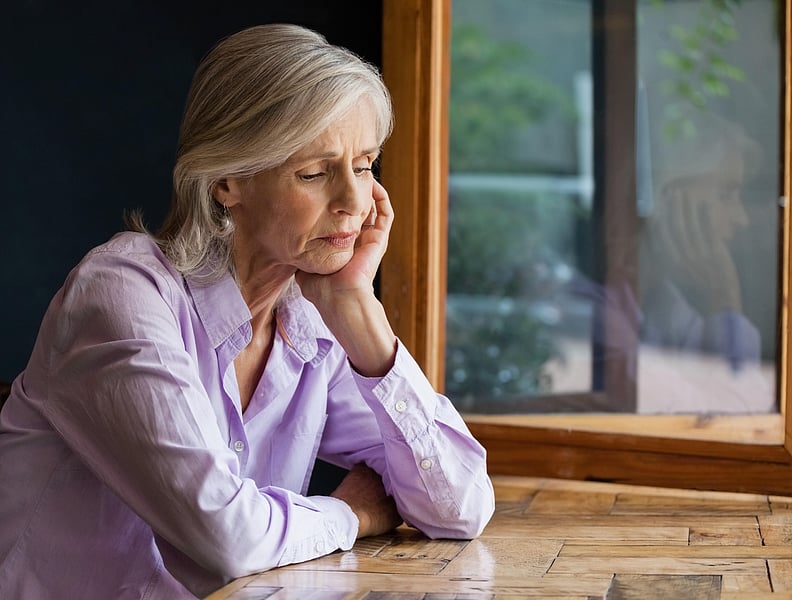Loneliness Can Really Break a Heart in People With Diabetes
By Amy Norton HealthDay Reporter | Copyright © 2022 HealthDay. All rights reserved.

THURSDAY, July 6, 2023 (HealthDay News) -- Loneliness might be a true heartbreaker for people with diabetes — raising their odds of a heart attack even more than unhealthy lifestyle habits do.
That's according to a new study of over 18,000 adults with the blood sugar disease. Researchers found that people who reported feeling lonely were up to 26% more likely to suffer a heart attack or stroke in the next decade, compared to those who felt more socially connected.
Loneliness, in fact, was more strongly linked to cardiovascular trouble than well-known risk factors like smoking, lack of exercise and unhealthy eating habits.
Still, the study, published recently in the European Heart Journal, does not prove that loneliness directly harms physical health.
But it's not the first to link feelings of isolation to heart disease: Experts said that many studies have found a similar connection, and the new findings bolster that evidence.
"Loneliness is not a benign condition," said Theresa Beckie, a professor at the University of South Florida College of Nursing.
Beckie, who was not involved in the study, co-wrote a 2022 scientific statement from the American Heart Association on the subject. In a review of published research, she and her colleagues found that social isolation and loneliness were linked to a 30% increased risk of heart attack and stroke, or death from either.
To Beckie, the new study adds a particularly striking layer: Loneliness appeared to be a bigger threat than risk factors as notorious as smoking and sedentary lifestyle.
Why? That's not fully clear and needs more study, Beckie said. But, she noted, people who feel lonely may be less apt to take care of their physical health.
The study also found a distinction between social isolation and loneliness: Only the latter was linked to a heightened risk of heart attack and stroke.
That might be because isolation is a situation, but loneliness is how you feel about it, according to senior study author Dr. Lu Qi.
People can live alone or not have an active social life, yet not feel lonely, explained Qi, a professor at Tulane University School of Public Health and Tropical Medicine, in New Orleans.
Conversely, they can have people in their lives, but depending on the quality of those relationships, still feel lonely.
Beckie agreed, and given that, she said, the findings make sense.
The results are based on over 18,000 British adults aged 37 to 73. At the outset, all had diabetes but no history of heart problems or stroke. They completed questionnaires on their lifestyle habits, any depression symptoms, and loneliness and social isolation.
Social isolation was gauged with questions on the number of people in a participant's household and how often they saw family and friends. Loneliness was measured with two questions: Do you often feel lonely? How often are you able to confide in someone close to you?
Most study participants (61%) did not fall into the lonely category. But about 9% scored a 2 on the loneliness measure (the highest possible score), while just under 30% scored a 1.
Over the next decade, over 3,200 study participants developed heart disease or had a stroke. The risk crept up in tandem with people's feelings of loneliness: It was 11% higher among those who'd scored a 1 and 26% higher for those who'd scored a 2.
People who felt lonely were worse off in certain other ways, too, the study found. For one, they tended to have more depression symptoms.
But depression did not appear to explain the loneliness-heart connection: The link remained even after Qi's team accounted for people's depression symptoms.
Still, Beckie said there is definitely a correlation between loneliness and depression. It's possible, she added, that feelings of loneliness are an early marker of depression to come.
Similar to depression, loneliness may zap people of their motivation to take care of their health. Qi noted, though, that there could also be more direct effects. Loneliness might, for instance, contribute to chronic inflammation in the blood vessels.
Beckie said the bottom line — for doctors and the general public — is to be aware that loneliness has health consequences.
"I think we as health care professionals need to take this seriously and ask patients about it," Beckie said.
What then? That's trickier, according to Beckie. She said there is evidence that helping people to "reframe" their loneliness — by performing small acts of kindness for others, for example — can help. But there is no simple prescription doctors can give to treat loneliness.
Having compassion for other people's loneliness is also important, Beckie said. Instead of brushing it off, she said, try asking them to have a cup of coffee or simply check in to see how they are doing.
More information
The American Heart Association has advice on coping with loneliness.
SOURCES: Lu Qi, MD, PhD, professor, department of epidemiology, Tulane University School of Public Health and Tropical Medicine, New Orleans; Theresa Beckie, PhD, RN, professor, nursing, and director, PhD program, University of South Florida College of Nursing, Tampa, Fla.; European Heart Journal, June 29, 2023, online




 Like the DIY idea of Dr. Leonardo websites, but just don’t want to Do-It-Yourself? We understand! Fussing over website details isn’t for everyone. But we do love building websites with our builder and we’re kind of obsessive about how we do things. Plus, we can build them lickety-split – typically in
Like the DIY idea of Dr. Leonardo websites, but just don’t want to Do-It-Yourself? We understand! Fussing over website details isn’t for everyone. But we do love building websites with our builder and we’re kind of obsessive about how we do things. Plus, we can build them lickety-split – typically in